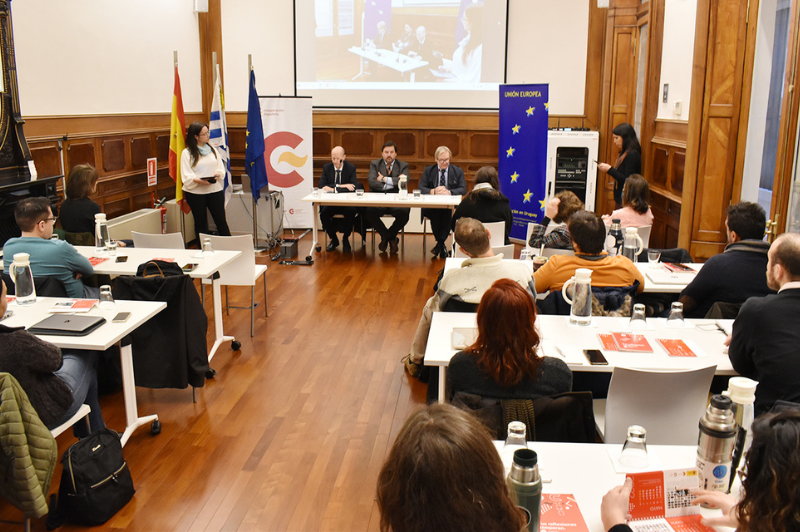The course "Hydrological models, water quality and integrated management of water resources" brought together representatives of various Uruguayan entities
with competence in water, environment and climate change, and speakers from the European Institute for Applied Research (DELTARES).
Montevideo, 15 July 2022. From 20 June to 8 July, the Spanish Cooperation Training Centre in Montevideo hosted the course "Hydrological models, water quality and integrated water resources management" in the framework of the Euroclima+ project "Integrated Water Resources Management in the Santa Lucia River Basin", which brought together representatives of various Uruguayan entities with competence in water, environment and climate change, and speakers from the European Institute of Applied Research (DELTARES).
The Santa Lucía river basin, located in the south of Uruguay, is of vital national importance as the source of drinking water for 60% of the country's population, which resides in Montevideo and its metropolitan area, while it is also the area where the main food production poles are located. In this regard, the "Adaptation in Action - Santa Lucía Basin" project aims to strengthen resilience to the impacts of climate variability in order to ensure the quantity and quality of the drinking water source, advancing the integrated management of the water resources. Toward this end, it proposes adopting technology and modelling for integrated water management and strengthening governance to support decision-making and the formulation of public policies, from a human rights perspective that includes gender equity.
This project is led by the National Water Directorate (Dinagua) of the Ministry of Environment and is financed by the European Union (EU) through the Euroclima+ programme, which delegates funds to the implementing agencies: the French Development Agency (AFD) and the Spanish Agency for International Development Cooperation (AECID).
Among the actions planned by the project, a three-week training session was held with the participation of 35 representatives of the Ministry of Environment, the Ministry of Livestock, Agriculture and Fisheries, the University of the Republic, the National Institute of Agricultural Research (INIA) and State Sanitation Works (OSE), in order to address the main problems of the Santa Lucia river basin: flood and drought events, and water quality.
In alliance with the Deltares Institute of the Netherlands, a Dutch entity with more than 80 years of experience in applied surface water research and infrastructure development, work was carried out on three management models. The first week was devoted to the hydrological model for evaluating and anticipating flood events and assessing the water supply in the basin. The second week was devoted to the water quality model, focused on simulating water quality processes and how they affect the different activities carried out in the basin, culminating in the third week with the study of the management model to evaluate the water supply and availability for all the works being carried out in the Santa Lucía river basin.
The inauguration of this training was attended by the Minister of Environment, Adrián Peña; the Head of Cooperation of the European Union Delegation in Uruguay, Markus Handke; and the Spanish Ambassador to Uruguay, José Javier Gómez-Llera, who reaffirmed the commitment of Spanish Cooperation in Uruguay, through its regional Technical Cooperation Office.
For his part, the Minister of Environment, Adrián Peña, stressed that this project is part of Uruguay's National Policy on Adaptation to Climate Change, which includes commitments, consensus and actions to prevent, mitigate and adapt to the negative impacts of climate change. This project, in turn, is aligned with the interests of the national government and the Ministry of Environment on the need to strengthen the resilience of Montevideo and urban localities located in the Santa Lucia river basin, as this is also one of the challenges at the global level.
Meanwhile, Markus Handke explained that the Euroclima+ programme is the flagship of the European Union that is contributing to environmental sustainability and the fight against climate change in Latin America and the Caribbean, implementing strategic actions, at both national and regional levels, based on the needs expressed by the partner countries and where the EU seeks to add value by offering the complementary experience of the different cooperation agencies of the Member States.
The "Adaptation in Action - Santa Lucia Basin" Euroclima+ project is led by the National Water Directorate (Dinagua) of the Ministry of Environment (MA). It is financed by the European Union through Euroclima+ and supported by AECID and AFD as implementing agencies, through the delegated cooperation of the European Union. This training was framed within result 1 of the Adaptation in Action - Santa Lucía Basin project, which refers to the strengthening of the situation and forecast room and technical training for the generation of hydrological prediction tools.
EUROCLIMA+ sector Water management with an urban resilience perspective
Through this sector of the EUROCLIMA+ programme implemented by the Spanish Agency for International Development Cooperation (AECID) and the French Development Agency (AFD), a total of seven projects will be implemented. For more information on each project, please visit: https://www.euroclima.org/en/water
About EUROCLIMA+
EUROCLIMA+ is a programme funded by the European Union and co-financed by the German federal government through the Federal Ministry for Economic Cooperation and Development (BMZ), as well as by the governments of France and Spain through the Ministry of Foreign Affairs, European Union and Cooperation.
The Programme's mission is to reduce the impact of climate change and its effects in 18 countries in Latin America and the Caribbean, promoting mitigation, adaptation, resilience and climate investment. It is implemented according to the "Spirit of Team Europe" under the synergistic work of seven agencies: the Spanish Agency for International Development Cooperation (AECID), the AFD Group: French Development Agency (AFD)/ Expertise France (EF), the Economic Commission for Latin America and the Caribbean (ECLAC), the International and Ibero-America Foundation for Administration and Public Policy (FIIAPP), the German Society for International Cooperation (GIZ) GmbH, and the UN Environment Programme (UNEP).
